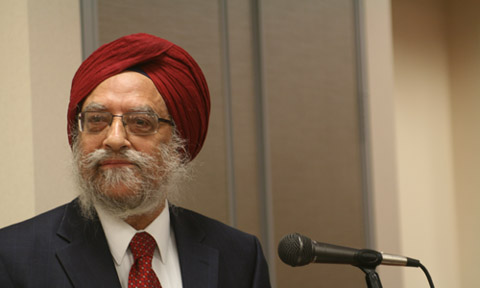
Dr. Amrit Singh receives a gift from his hosts, Dr. Meenakshi Raman and Dr. Nilak Datta of BITS Pilani (Goa Campus) after giving a talk on the American Frontier on April 16, 2015.
Dr. Amritjit Singh gave a public lecture on “The ‘Frontier’ and the American Imagination: A Retrospective View” on April 16 at Birla Institute of Technology and Science, Goa Campus, India.
Singh, Langston Hughes Professor of English at Ohio University, is currently a Fulbright-Nehru Visiting Professor of English at the University of Delhi.
Abstract: In 1893, Frederick Jackson Turner bemoaned the “closing” of the American frontier – the disappearance by the 1890s of cheap, fertile and accessible lands out West. He wondered what would happen to the American people, American democracy and the American character in the wake of such a loss, but he had no clear answers. He worried that same amalgamating process would not occur in the fast-growing cities. The work of most U.S. historians well into the middle of the 20th century appears to have been built upon Turner’s perspectives as well his anxieties. In different ways, foundational American Studies texts such Henry Nash Smith’s Virgin Land (1950), R.W.B. Lewis’s The American Adam (1955) and Leo Marx, Machine in the Garden (1964) signal the continuing influence of Turner’s Frontier thesis in relation to the American experiment and its “exceptionalism,” as well as the implicit “ideas of civilization, progress and Manifest Destiny.” It is only in the 1970s that some of the assumptions underlying the Frontier Thesis regarding civilization, progress and democracy began to be questioned, especially in relation to the patterns of exclusion and repression that accompanied the Westward movement that impacted the lives of women, Native Americans and others.
Through my presentation and in the pursuant conversations, we will, I hope, have an opportunity to (a) consider the aforementioned revisionist views of both the Frontier as well as the American character and democracy and connect them to Critical Race Theory; (b) acknowledge the riffs and counter-narratives that had already appeared in the writings and careers of late 19th-century and early 20th-century figures such as Frederick Douglass, W. E. B. Du Bois, and Americo Paredes; (c) reference the new takes on the Frontier by contemporary novelists such as Ishmael Reed and E. L. Doctorow, which were prefigured in some ways in Stephen Crane’s short stories; (d) examine the parallels between European colonialism and the American Empire – based on the scholarship of Amy Kaplan, Donald Pease, etc., and contextualized by Amritjit Singh and Peter Schmidt in the opening “Borders” essay in Postcolonial Theory and the United States (2000); and (e) draw lessons if any for a democratic nation such as India in the morphing of the Frontier Thesis into the current discourses on Borderlands, White Privilege, Feminism, Masculinity, and Multiculturalism.


















Comments